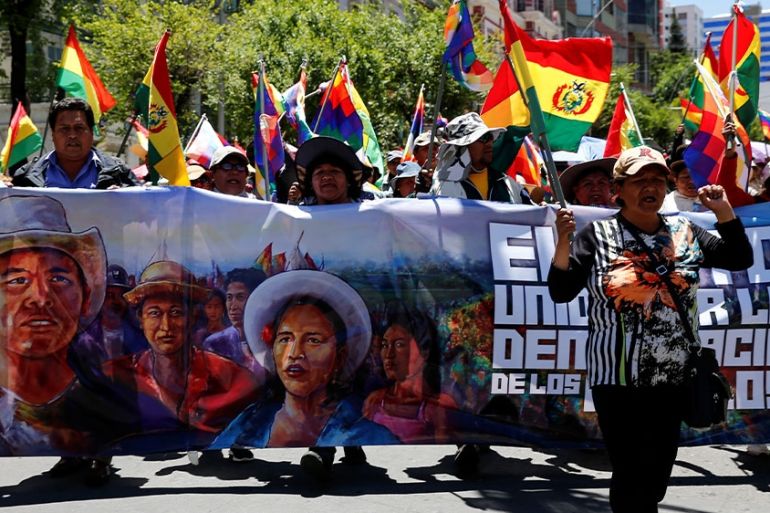OAS begins audit of Bolivia’s election amid growing protests
At least two people have been killed in protests over the October 20 election results.

La Paz, Bolivia – The Organization of American States (OAS) started to audit Bolivia‘s presidential election on Thursday, as protests over the results turned deadly with at least two people killed.
In a letter to Bolivia’s Foreign Ministry, the OAS said it has organised a team of 30 electoral technicians who will review how the votes of the October 20 elections were tallied, and how information was transferred to electoral authorities in La Paz from voting centres across the country.
Keep reading
list of 3 itemsBolivia: Count gives Morales win, but opposition rejects result
Bolivia election: Will Evo Morales win a controversial 4th term?
The official results granted President Evo Morales his fourth consecutive term, after he obtained just enough votes to avoid a runoff election against Carlos Mesa, the leading opposition candidate.
Opposition parties in Bolivia, who have refused to recognise Morales’s victory, claim the election was manipulated by the country’s electoral tribunal, which is made up of officials largely appointed by the ruling party.
On election night, with 83 percent of the votes tallied, official results showed Morales as having about a seven percentage point lead over Mesa. Publication of results was abruptly halted and when it resumed a day later, 95 percent of the votes had been counted, and Morales had the 10 point lead needed to avoid a risky runoff.
Morales said the lead was thanks to votes that came in late at night from rural, indigenous areas, where he maintains strong support. But the OAS mission in Bolivia has cast doubts on this explanation saying that the sudden change in voting patterns is “difficult to justify”.
Protests and violent riots erupted across the country in response, as thousands took to the streets denouncing what they called what an unfair election.
“We can’t allow the government to steal our votes,” said Joel Vicente, a 23-year-old engineering student who marched towards the presidential palace on Wednesday along with thousands of anti-government protesters.
“If we believe in democracy we must remain in the streets.”
Morales, a former union leader, threatened on Saturday to mobilise his rural supporters, and block the supply of food to cities where protests over the elections continue.
But he also invited the OAS to audit the election and said that he will respect its findings, which could take up to three weeks. European Union and OAS officials have already suggested that holding a runoff between Morales and Mesa could be a suitable solution.
Mesa said on Wednesday that he will only accept the audit if his party is allowed to oversee the process, and if the results of the elections are first annulled.
“This is a deal between the government and the OAS and no one asked us if we agreed to it,” said Miguel Roca, a member of Mesa’s Citizens’ Community party who won a seat in Congress during the recent election.
“If suspicions of fraud are so great that the OAS needs to come in to audit the election, how can we accept the current results?” said Roca, who has been organising roadblocks in his electoral district as a form of protest.
Roca added that Bolivia’s opposition is looking for more guarantees that the audit will be impartial and binding.
“We need to establish a serious conversation on how this will be carried out in a form that ensures transparency, and the trust of voters,” he said.

Erosion in trust
Many Bolivians say trust in Morales began to erode back in 2016, when he organised a national referendum asking Bolivians if the constitution should be amended to allow him to run for a fourth term.
Fifty-one percent of voters said “no” to the proposal, but Morales refused to accept the results. The following year, his party appealed the decision to a high court and obtained a ruling that allowed him to run indefinitely, arguing that term limits would be a violation of his political rights.
“Morales wants to hold on to power so badly, that he doesn’t listen to what we tell him,” said Adriana Aneiva, a graphic designer who has been taking part in the recent protests. “He has made a mockery of our constitution.”
But Morales kept a solid support base in rural areas and working-class districts in Bolivia that have benefitted from his government’s social policies. And many have said that they would be pleased to see him in office for another five-year term.

Severo Lampa, an alpaca herder said his region in southern Bolivia was “a really sad place” in 2006, when Morales was first elected president.
“We all lived in adobe homes, we didn’t’ know what a brick home was,” he said during a pro-Morales march in La Paz.
Now he says people in his village of Culta live in better homes and the government has invested in local infrastructure, including roads, a park and a public school.
“We came here to defend our vote,” he said.
“With Evo, Bolivia has changed a lot.”